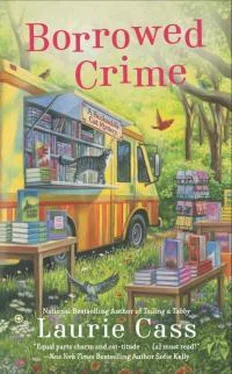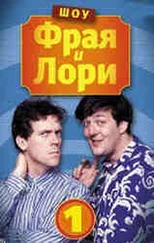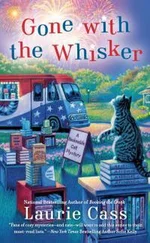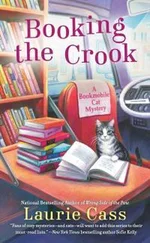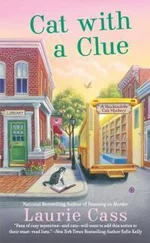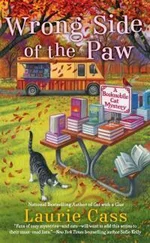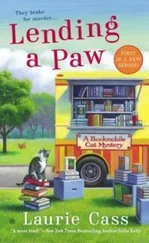I grinned. Eddie, who would send me a if-looks-could-kill expression if I so much as gave him one pat more than he wanted, had always allowed Brynn to toss him around like a stuffed animal. But I also didn’t want Mr. Kindergarten Teacher to have a heart attack, so I edged forward around the line of small children that was forming to Brynn’s command.
“Sit up here,” I told her, patting the console, “and Eddie can sit right next to you. That way you can keep petting him.”
She frowned, obviously considering my statement as a suggestion, then nodded. I took Eddie from her, she jumped up, and I nestled Eddie appropriately.
“This is a good idea.” She patted Eddie between the ears, making his head bounce a little. “Okay,” she said, pointing to the youngster at the head of the line. “You can pet him first.”
I backed away, but not too far away. Eddie had always been beyond tolerant of children, but you never knew, so I made sure I was close by, just in case.
“So that’s Eddie,” Andrew said.
I laughed. “You’ve heard stories?”
“Looks like some of them may even be true,” he said, making me revise my previous judgment of his humor level. “Once we got this date scheduled, Brynn has talked nonstop about Eddie and the bookmobile and all the fun books and games and music, and did I mention Eddie?”
The first few kids in the line had received their allotment of Eddie and the accompanying Eddie hair. As they came back around, I pointed out the picture books, and Donna showed them the music and the board games we’d started lending at the end of the summer. The whole thing was going smoother than if I’d planned it for a month.
“Look at that,” Andrew murmured, nodding at the way the kids were exclaiming over the books they were pulling off the shelves. “They’re excited about reading.”
“The Eddie Effect,” I said, smiling.
“Or is it the Bookmobile Effect?” Andrew gestured at the kids who were still waiting in line.
Only they weren’t just waiting; they were looking at the contents of the shelves, running their hands over the bindings, and pulling books out to take a look. I could already tell that would take forever to straighten up the bookmobile, but the time would be well worth it. An investment of sorts.
“The Bookmobile Effect,” he said again. “Bringing books and the love of reading wherever the road takes you.”
I beamed at him. “Would you mind writing that down in letter form and sending it to my boss? Because I’m still having to justify the expense.”
Andrew looked around. “Yeah, this can’t be cheap, can it? And after what happened the other Saturday . . .” He caught my expression. “Oh. Sorry. You probably didn’t need a reminder of that.”
Didn’t need and didn’t want. I put on a smile and changed the subject, but the gleam had gone out of the day.
* * *
That evening, my loving aunt met me at the door and handed me a piece of paper as soon as I released Eddie from the carrier.
“We need a few more things for Thanksgiving,” she said.
I scanned the lengthy list, then turned over the paper and read the other side. “What are fennel seeds?”
She gave me a look. “Do you really want to know?”
Of course I didn’t. I was perfectly happy to be the grocery store–goer, the table setter, and the cleaner-upper. The last thing I wanted was any part of the actual cooking. The one time I’d tried to partake in the annual ritual, back in my graduate school days, when I couldn’t afford the gas to drive home, had been a meal of overcooked Cornish game hens and undercooked potatoes.
I pointed at the list. “All I want to know is where to find fennel seeds.”
“In with the spices,” she said. “Don’t be too long—I’m making fajitas for dinner and the chicken is almost done marinating.”
After rezipping my coat, I headed back out, thinking for the zillionth time how lucky I was to have Aunt Frances in my life. Someday I’d want to buy my own house, but until I could gather up a nice down payment, there wasn’t any likelihood of that happening.
Standing on the bottom step of the porch, the wood creaking a bit underneath my weight, I read the list one more time. It was long, but none of the items was bulky (except for paper towels) or heavy (except for a can of tomato soup), and, since I’d spent most of the day sitting, I eschewed taking the car and went on foot. Without a doubt, I’d regret the decision before I got halfway back, but I pushed that thought out of my head and started walking.
Just outside the grocery store, however, my fast walk slowed to a slow stroll and then to an amble. Denise Slade was getting out of a car not thirty feet away from me. If I used exquisite timing, I could keep my head down while studying the list and avoid eye contact altogether. After all, the last time I’d seen her, she’d said it was my fault that Roger was dead. Why would I want to open myself up to another round of that? Plus, there was the little matter of Roger’s sister’s lawsuit. I wasn’t sure whether Denise was on board with it, but this was one librarian who really didn’t want to find out.
It was tempting to avoid her. So tempting that I pulled the list out of my pocket and unfolded it. But then my mother’s voice boomed inside my head: “Minnie, don’t let me catch you taking the easy way out.”
Why her voiced boomed, I wasn’t sure, since my mother was a soft-spoken woman who only raised her voice if there was imminent danger of bloodshed. Well, that or if someone happened to mention a dislike of history.
But, once again, Mom was right. Denise was grieving, and grief could make you lash out at people. I should forgive her and do what I could to help.
Even if I don’t want to?
I asked the question of my mom via mental telepathy, which I was pretty sure didn’t work.
Especially then, came the answer.
I sighed and put the list back into my pocket. “Hey, Denise,” I said. “How are you?”
She jumped. “Oh. Hi, Minnie.”
A long moment of silence went by. Just after it got extremely uncomfortable, I asked, “I heard you were in a car accident. That must have been frightening. I’m so sorry.”
She nodded slowly. “Thank you.”
I looked at her. Denise normally talked at a rate a notch faster than the rest of the world, but right now she was speaking as if she were translating in her head. That, in addition to her unusual politeness, indicated that something was seriously wrong. Of course, it could have been her way of dealing with Roger’s death, but this wasn’t carrying the sense of grief.
“Are you sure you’re okay?” I asked. “You weren’t hurt in that crash, were you?”
“Fine,” she said vaguely. “I’m fine. It’s just . . .”
My baser self, the part of me that deeply wanted to escape into the store, warred with the part of me that remembered my mother’s admonitions to treat others as we would like to be treated. For years I’d thought she’d meant that people should be nicer to me, but I’d eventually caught on.
I took a step closer. “Just what?”
Denise looked at me, anguish on her face, and the words she’d been holding inside came rushing out.
“It’s that deputy. Wolf-something. He talked to me, said that someone might have been trying to kill me, that someone had done something to my car to make it crash, that you said Roger had my hat when he was killed, that it might have been me who someone wants dead, that Roger . . . that it was me . . . that I should have been the one, not him . . .”
Her sentence dissolved into a racking sob. I stepped close, put my arms around her, and let her hang on to me as she cried and cried and cried.
Читать дальше
